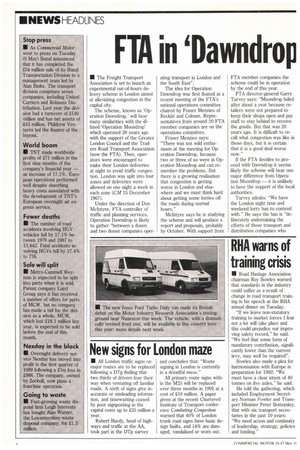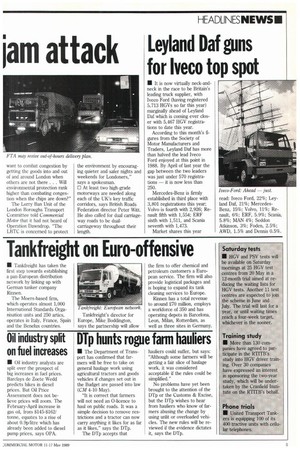FTA in lawndrop jam attack
Page 6

Page 7

If you've noticed an error in this article please click here to report it so we can fix it.
• The Freight Transport Association is set to launch an experimental out-of-hours delivery scheme in London aimed at alleviating congestion in the capital city.
The scheme, known as Operation Dawndrop,' will bear many similarities with the illfated 'Operation Moondrop' which operated 20 years ago with the support of the Greater London Council and the Traders Road Transport Association (now the FTA). Then, operators were encouraged to make their London deliveries at night to avoid traffic congestion. London was split into four zones and deliveries were allowed on one night a week in each zone (CM 15 December 1967).
Under the direction of Don McIntyre, FTA controller of traffic and planning services, Operation Dawndrop is likely to gather "between a dozen and two dozen companies oper
ating transport in London and the South East".
The idea for Operation Dawndrop was first floated at a recent meeting of the FTA's national operations committee chaired by Fraser Menzies of Reckitt and Colman. Representatives from around 20 trrA member companies are on the operations committee.
Fraser Menzies says: —There was not wild enthusiasm at the meeting for Operation Dawndrop, because two or three of us were in Operation Moondrop and can remember the problems. But there is a growing realisation that congestion is getting worse in London and elsewhere and we must think hard about getting some lorries off the roads during normal hours."
McIntyre says he is studying the scheme and will produce a report and proposals, probably by October. With support from FTA member companies the scheme could be in operation by the end of this year.
FTA director-general Garry Turvey says: "Moondrop failed after about a year because retailers were not prepared to keep their shops open and pay staff to stay behind to receive the goods. But that was 20 years ago. It is difficult to recall what congestion was like in those days, but it is certain that it is a good deal worse now."
If the FTA decides to proceed with Dawndrop it seems likely the scheme will bear one major difference from Operation Moondrop — it is unlikely to have the support of the local authorities.
Turvey admits: "We have the London night time and weekend lorry ban to contend with." He says the ban is "deliberately undermining the efforts of those transport and distribution companies who want to combat congestion by getting the goods into and out of and around London when others are not there . . . Will environmental protection rank higher than combating congestion when the chips are down?"
The Lorry Ban Unit of the London Boroughs Transport Committee told Commercial Motor that it had not heard of Operation Davmdrop. "The LBTC is concerned to protect
the environment by encouraging quieter and safer nights and weekends for Londoners," says a spokesman.
D At least two high-grade motorways are needed along each of the UK's key traffic corridors, says British Roads Federation director Peter Witt. He also called for dual carriageway roads to be dualcarriageway throughout their length.
























































































































